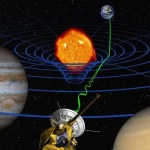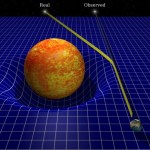gravity
There's a minor scandal in fundamental physics that doesn't get talked about much, and it has to do with the very first fundamental force discovered, gravity. The scandal is the value of Newton's gravitational constant G, which is the least well known of the fundamental constants, with a value of 6.674 28(67) x 10-11 m3 kg-1 s-2. That may seem pretty precise, but the uncertainty (the two digits in parentheses) is scandalously large when compared to something like Planck's constant at 6.626 068 96(33) x 10-34 J s. (You can look up the official values of your favorite fundamental constants at…
"The only problem with the speed of light, is it gets here too early in the morning." -Danny Nevrath
One of the most common questions I get asked is whether gravity is instantaneous, or whether there's a speed limit to how fast the force of gravity can travel.
It's a good question! After all, we know how fast light travels, and if the Sun were to suddenly wink out of existence, we'd still receive light from it for just over 8 minutes after it disappeared! But what about gravity, and the Earth's orbit? Would the Earth simply fly off in a straight line, like a twirled poi ball the instant a…
"We can easily forgive a child who is afraid of the dark; the real tragedy of life is when men are afraid of the light." -Plato
Imagine, if you will, the year 2200. Forget about the flying cars and robotic exoskeletons, though. I'm thinking about the incredible scientific tools we'll have at our disposal, as well as the huge set of information we'll have available about the Universe.
One day, the latest telescope project gets completed, and we're finally able to make detailed measurements of an extra-solar planet's surface!
We'd already been able to learn much about this planet, including…
"If you only look at a person through one lens, or only believe what you're told, you can often miss the truth that is staring you in the face." -Kevin Spacey
One of the most powerful ideas from Einstein's theory of Gravity -- General Relativity -- is that any massive object in the Universe not only causes a gravitational force on other masses, but also bends light!
Image credit: Dave Jarvis of http://davidjarvis.ca/dave/gallery/.
(Link to David Jarvis' gallery.) This was confirmed in 1919 by observing the positions of stars during a total solar eclipse; the stars closest to the Sun had…
"I do not feel obliged to believe that the same God who has endowed us with sense, reason, and intellect has intended us to forgo their use." -Galileo Galilei
Geez, Ethan, why don't you take on a bigger question?
This question of "fundamental things" has a special meaning to scientists and natural philosophers, going all the way back to Thales of Miletus, 2600 years ago, who began asking about the arche (αρχή), which is the "element" or "prime cause" of existing things.
Of course, the scientific enterprise was just beginning, so you can't fault Thales too much for coming up with "water". But…
"The Universe is made mostly of dark matter and dark energy, and we don't know what either of them is." -Saul Perlmutter
When I was starting out as a graduate student, one of the most exciting (and daunting) tasks facing me was to piece together a scientifically accurate and useful picture of the Universe, including its composition, structure, and history. (And I owe a huge shout-out to my PhD advisor, who helped me immeasurably in that task.)
The big question facing me, as far as I was concerned, was deciding whose ideas were right, and which were the ones I should spend my time and energy…
While I am still fresh on the Space Jump topic, let me take it to the extreme. Star Trek extreme.
SPOILER ALERT
But really, is this a spoiler alert if it is from the trailer of a movie that has been out forever? Of course, I talking about the latest Star Trek movie where three guys jump out of a shuttle and into the atmosphere.
So, in light of the Red Bull Stratos jump, how would this jump compare? First, my assumptions:
This Star Trek jump is on the planet Vulcan. I am going to assume this is just like Earth in terms of gravity and density of air.
The jumpers in Star Trek have on stuff…
Crazy, but I was on CNN Saturday night. They contacted me at the last minute to talk about the Red Bull Stratos Jump. Here is a screen shot to show that I am not making this up (or that I have awesome photoshop skillz).
Looking back, maybe I looked like an idiot. Really though, it wasn't my fault. I thought we were going to talk about physics. The first two questions threw me for a loop. Here are the two questions and my response (roughly paraphrased):
Will Felix survive the jump?
Answer: I guess so.
Is there a scientific reason for this jump?
Answer: I thought we were going to talk…
"I would rather be a superb meteor, every atom of me in magnificent glow, than a sleepy and permanent planet. The function of man is to live, not to exist. I shall not waste my days trying to prolong them. I shall use my time." -Jack London
Most of you have seen a shooting star before, also known as a meteor.
They happen most frequently during (surprise) meteor showers, but occasionally (and sparsely) during other times of the year. Whenever a small bit of astronomical dust from outer space runs into the atmosphere -- even though it may be no bigger than a grain of sand -- it burns up in the…
A new video from the Red Bull Stratos Jump guys came out. Here it is:
This reminds me of an unanswered question about the Stratos jump that I didn't address on my last post on this topic. Commenter Long Drop asked about how much Felix would heat up as he falls from 120,000 feet. This is a great question. The first, off the bat answer is that he won't heat up too much. Why do I say this? Well, when Joe Kittinger jumped from over 100,000 feet and didn't melt. Still, this is a great thing to calculate.
How do you calculate something like this? I will look at this in terms of energy. For…
"From the intrinsic evidence of his creation, the Great Architect of the Universe now begins to appear as a pure mathematician." -Sir James Jeans
Last time we met, I posed a mystery to you: why are globular clusters the smallest in the Universe?
And what's more than that, we never find them in isolation! We always find them bound to galaxies (or, if not bound to a galaxy, then within a cluster of galaxies; thanks Steinn), but never just off in deep space, floating on their own like some lone Death Star.
Like all structures in the Universe, everything we're talking about here -- stars,…
Grades are in. So, let me just say a couple of trends that I saw on the physical science final exam.
Gravity on the moon
I asked the question: "why is the gravitational force on an astronaut less on the moon than on Earth?"
The simplest answer is that the gravitational field on the moon is smaller than on Earth (I would accept that answer). Why is this? It is because the moon as a much smaller mass even though it also has a smaller radius (that idea is rather complicated for this class - that gravitational force depends on both mass and radius). I would also take "the mass is smaller" as…
People are like stained-glass windows. They sparkle and shine when the sun is out, but when the darkness sets in their true beauty is revealed only if there is light from within. -Elisabeth Kübler-Ross
Welcome back to The Greatest Story Ever Told, where we're covering the natural history of the Universe from before the Big Bang to the present day. You can catch up on the first eight parts here, going forward from Inflation in part 1 to parts 2, 3, 4, 5, 6, 7, and reaching the formation of the first neutral atoms in part 8. But during all of this time, gravity has been working its magic.
In…
I was going through and tagging some old posts. While looking at a post attacking the movie Sunshine, I accidentally found something else on youtube.
Gravity in Sunshine
I could not find a clip online of the scene I want, so I made a cartoon. Basically, (oh - spoiler alert) some guys are trying to get from one spaceship to another by shooting out of the airlock and into the other. They fly through space and into the other airlock, close the door and emergency pump the air in. When the closed air lock fills with air, they all fall down. Since there was no online video version, I made a…
"Cosmologists are often in error, but never in doubt." -Lev Landau
I've been telling you about the Big Bang, the greatest story ever told, and the entire natural history of the Universe. Let's remind you -- historically -- of how our conception of the Universe changed as we learned more about our surroundings.
Maybe the first astronomical observation ever made was that the Sun rises in the East, passes overhead, and sets in the West. And it does this day after day, every day. It's no wonder that our first "cosmological model" of the Universe was that the Earth is stationary, and the Sun…
The most formidable weapon against errors of every kind is reason. I have never used any other, and I trust I never shall. -Thomas Paine
I've been telling you the history of the Universe over the past few months in serial. Parts 1 through 8 are currently up, and have taken us from Inflation up through the formation of neutral atoms, covering the first 380,000 years of the Universe. During this whole time, like a giant balloon, space has been expanding.
One thing I haven't paid much mind to is just how the Universe has been expanding during this time. The concept is relatively straightforward…
"No matter how dark things seem to be or actually are, raise your sights and see the possibilites -- always see them -- for they are always there. -Norman Vincent Peale
Dark matter. I talk about it a lot here for a number of reasons. These include:
the fact that it makes up about 85% of the mass of the Universe,
the only way (so far) that it appears to interact with anything is gravitationally, and
from our observations, we've learned that it's made up of slow-moving, massive particles.
You put what we know about dark matter into a simulation, and it tells you what type of structure you…
Note: I'm on vacation this week, so here's one from the vault. This article first appeared on my old website, back in February of 2009.
Some days the questions I get are easy, and some days I get questions from our longtime reader, Ben. This past week, there have been reports all over the news that our world may be a giant hologram. Let's take a look at what's going on.
In Hanover, Germany, there's an experiment called GEO600. These are two perpendicular lasers, and they shoot out for thousands of feet, get reflected, and come back to their original location to make an interference pattern…
I happened to catch two parts of two different episodes of Meteorite Men - a show about two guys that look for meteorites. In both of the snippets I saw, they were talking about a debris field for a meteor that breaks up. In these fields, the larger chunks of the meteorite are further down in the field. Why is this?
Let me approach this first from a terminal velocity view. This requires a model for air resistance. I will use the following:
Where:
rho is the density of air
A is the cross sectional area of the object
C is a drag coefficient that depends on the shape of the object
v is…
The Truth is far more powerful than any weapon of mass destruction. -Gandhi
Last time, I spoke to you about how tides work on Earth.
In a nutshell, a nearby massive body (like the Moon or the Sun) pulls on the Earth's center due to its gravity. But the portion of the Earth that's closest to that massive body gets pulled with a slightly greater force, while the portion that's farthest gets pulled with a slightly smaller force. This differential force, known as a tidal force, causes objects to be stretched out, and causes our oceans to bulge at the points nearest and farthest from the Moon,…












